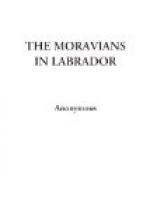Hitherto the settlements, though occasionally visited by the contagious diseases that periodically afflicted the country, had never known more than a partial sickness; but in 1811, the small society at Hopedale suffered severely from an epidemic, which, so far as we are able to judge from the symptoms mentioned in the diary, quoted below, bore some distant resemblance to the spasmodic cholera. “On the evening of the 24th of July, we were all suddenly thrown into the greatest confusion, by the arrival of a boat, with our people, from Tikkerarsuk, one of their provision-places in the south: Mark—formerly Siksigak—was dead, and several others dangerously ill. When they went out in the morning, they were all in good health, but were suddenly seized with a nervous affection, which, in a very short time, terminated fatally; notwithstanding every assistance, Samuel died in the night. Next morning another boat arrived, and brought Adam and Isaac, both dead, though they had yesterday been both fishing in their kaiaks; the four dead bodies were obliged to be immediately buried, as they quickly showed signs of corruption. The same evening, Daniel brought in his boat four dying persons; at five o’clock the younger, Mark, died. On the 26th, early in the morning, the widow Rebecca, and in the forenoon, young Philip departed; before twelve o’clock, the bodies became so offensive, that it was necessary to inter them. All were filled with alarm and terror, but to our comfort we also remarked submission to the will of the Lord. The sick, in general, declared they were willing to go to the Saviour when he should call them; some said they felt their unworthiness to appear before him, and yet expressed their reliance upon his sufferings as their only refuge; but from total debility and oppression they could speak very little: they complained of great weakness, lameness, blindness, and a feeling of suffocation. At four in the afternoon little Abel, and in the same tent, the widow Salome, and at six o’clock old Thomas, (Kapik,) died. 27th, There was little improvement; besides those who remained ill many more began to complain, and cried out to us for assistance, so that we knew not where to go or who to help first. At eleven o’clock the four dead were buried, which made ten. On the 29th a great many were taken ill; at four in the afternoon, Magdalene departed comfortable and happy. Father Abel, who had willingly assisted in burying the dead, followed the same evening. His wife, Benigna, who had faithfully attended the sick, was prevented from nursing him, being herself laid up. The dead bodies were laid in their place of rest next day. We now felt that all of us were more or less worn out by this great affliction, some of us actually sick, and none certain but he might be seized the next moment. To add to our distress, many children were rendered orphans by the loss of both father and mother, which called forth our sighs to our gracious and merciful God and Lord for his compassion




